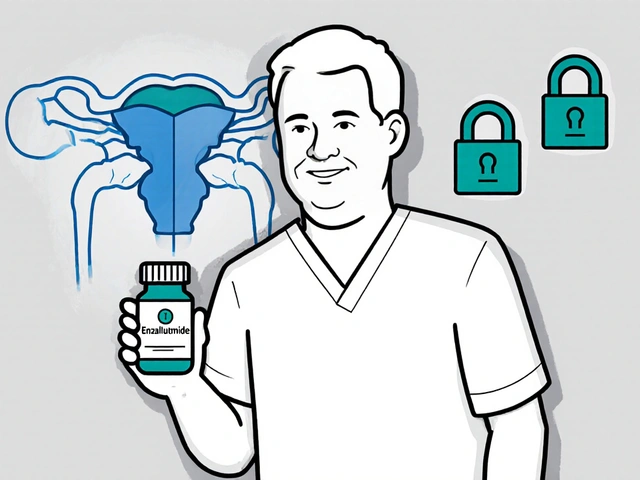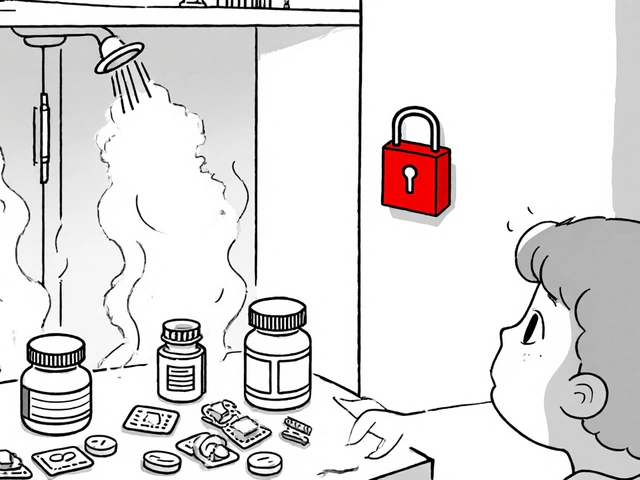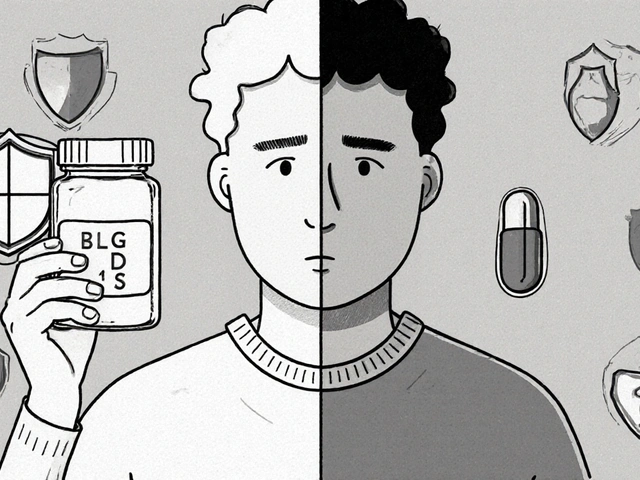Living with HIV can be challenging, but medications like Atazanavir make a huge difference. It’s not just about popping a pill daily. There's a real journey here, involving changes both in your body and lifestyle.
To start, Atazanavir is an antiretroviral drug that helps manage HIV. It belongs to the protease inhibitor class, which means it blocks a specific enzyme HIV needs to replicate. Pretty neat, right? This means less virus in the body, leading to a stronger immune system.
But what’s life like on Atazanavir daily? That's where real adaptability skills shine. Some folks experience side effects, but with a smart approach and a bit of patience, they become manageable. We'll unpack these experiences and offer practical tips to navigate them. Whether it’s dietary tweaks or syncing the medication with your other routines, there’s a rhythm to find.
And then there's the emotional side. A support network makes all the difference. From healthcare providers to friends who get it, finding those connections can lighten the load considerably.
- Introduction to Atazanavir
- How Atazanavir Works
- Impact on Daily Life
- Managing Side Effects
- Lifestyle Adjustments
- Support and Resources
Introduction to Atazanavir
Alright, let’s get into the nuts and bolts of Atazanavir. This medication has been a game-changer for many living with HIV. It hit the scene in the early 2000s and quickly became a staple in antiretroviral therapy. Here’s why: Atazanavir is a protease inhibitor, which means it helps keep the virus from making copies of itself. Fewer copies mean less virus in the body, which is a win!
Why choose Atazanavir over other options? It’s often due to its once-daily dosage and its unique ability to maintain a favorable lipid profile compared to some older HIV meds. What does that mean for you? It means more convenience and possibly fewer worries about cholesterol levels.
How Atazanavir is Taken
Usually, Atazanavir is taken as part of a combo therapy, often with a boosting agent like ritonavir or cobicistat. This boosts its effectiveness, making it a solid choice for keeping HIV at bay. Daily routines often involve a single dose with a meal to help your body absorb it better.
Availability and Cost
Luckily, Atazanavir is widely available and is part of many health insurance plans. However, it's always a smart move to check with your provider about coverage specifics and potential financial assistance programs if needed. The more you know, the better armed you are to advocate for yourself.
Now, if you're the numbers type, here's a quick look at how Atazanavir stacks up:
| Year Approved | Daily Dosage | Common Booster |
|---|---|---|
| 2003 | 300 mg | Ritonavir or Cobicistat |
Understanding the basics of how Atazanavir works and fits into your treatment plan can really empower you in your journey. Keep these essentials in mind, and you’ll be navigating your medication with confidence!
How Atazanavir Works
Alright, let's break down the science behind Atazanavir. Picture HIV as a sly thief trying to break into your immune system. To stop this break-in, Atazanavir steps in as the guard, blocking the enzyme called protease. This enzyme is crucial for HIV to multiply and spread within your body.
Blocking the Protease
So, here’s the deal: Atazanavir, when taken correctly, binds to this enzyme. Think of it as a lock and key mechanism. By doing this, the antiretroviral drug prevents the virus from maturing and multiplying. It's like putting handcuffs on the thief, stopping it in its tracks.
You might be wondering, why is this important? Well, fewer HIV particles mean your body’s immune system gets a much-needed break and a chance to recover. That's why it's a big player in HIV management.
The Importance of Adherence
Now, consistency is key here. Atazanavir works best when taken as part of your daily routine. Why? Because skipping doses or not following the schedule can give the virus a chance to thrive again. It’s not just about taking a pill; it’s about sticking to the plan your healthcare professional gave you.
| Atazanavir Effectiveness | Details |
|---|---|
| Effect on Viral Load | Reduces HIV to undetectable levels |
| Impact on CD4 Count | Helps increase CD4 count, boosting immune strength |
This table highlights how effective Atazanavir can be. When managed well, it can dramatically reduce the viral load, sometimes to undetectable levels! Not only does this boost your immune system, but it also lowers the risk of transmitting the virus to others.
Understanding how Atazanavir works makes you a pro at managing HIV. With this knowledge, you're empowered to make smart choices and stay on top of your health game. Remember, this journey is all about teamwork – you, Atazanavir, and your healthcare team all playing a part.
Impact on Daily Life
Living with HIV and managing it using Atazanavir requires some real life changes, but it’s often the small adjustments that make the biggest difference. For starters, taking your medication at the same time every day is crucial. It helps keep your viral load low and your immune system strong.
Daily Routine Changes
Sticking to a routine becomes essential. It's not just about remembering to take your pills but integrating them into your life in a way that doesn’t disrupt everything else. Some folks set alarms on their phones or pair their doses with daily activities like breakfast or brushing their teeth. These little hacks are game-changers.
Side Effects and Solutions
Now, about those side effects. Some people on Atazanavir might notice things like nausea or jaundice. Sounds alarming, but with advice from healthcare providers, these can become manageable. A change in diet, staying hydrated, or talking to your doctor about additional medications to ease discomfort can really help.
Social and Emotional Aspects
Being on HIV medication also affects social interactions. You might feel hesitant to share your status. It's completely okay to keep it private, but finding a trusted person to talk to can be incredibly relieving. Plus, knowing you have support can reduce stress.
| Aspect | Impact |
|---|---|
| Daily Routine | Increased structure and medication schedules |
| Side Effects | Manageable with tweaks and advice |
| Social Life | Having a support system is beneficial |
Incorporating these changes doesn’t just help with managing HIV, they help in leading a balanced, healthier life. And at the end of the day, knowing you have control makes all the difference.

Managing Side Effects
When starting on Atazanavir, dealing with side effects can feel a bit overwhelming, but it’s totally manageable with the right approach. Let’s dive into how we can tackle some of the most common ones.
Common Side Effects
A few people might experience jaundice, which is when your skin or eyes take on a yellowish tint. It sounds intense, but it doesn’t affect liver function and often reduces over time as your body adjusts.
There are also reports of some digestive issues like nausea or stomach discomfort. Keeping a few bland snacks around can help settle the stomach before medication time.
Tips for Managing Jaundice
- Keep regular hydration: Drinking water consistently can sometimes help manage jaundice. Don't underestimate the power of a good hydration routine.
- Regular check-ups: Make it a habit to consult your healthcare provider; they might suggest a liver function test to keep an eye on things.
Dealing with Nausea
No one likes feeling queasy, so here’s a practical approach:
- Small meals: Eating smaller portions more frequently can help keep nausea at bay.
- Ginger or peppermint: Natural remedies like ginger tea or peppermint candies can ease an upset stomach.
Every person's experience is unique; some side effects may not even pop up, and that’s completely normal too. Don’t hesitate to reach out to your medical support team for personalized advice.
With these steps, managing the side effects of Atazanavir becomes less daunting, ensuring that you can focus more on living life to the fullest.
Lifestyle Adjustments
When you start taking atazanavir, it's not just about swallowing a pill. There are some lifestyle tweaks you might need to consider to help the medication do its thing. Let's talk about a few of these adjustments that can help make living with HIV a bit smoother.
Eating Habits
First off, food plays a part. Atazanavir should be taken with food, which helps your body absorb the medication properly. We're not talking about a gourmet meal—just a regular snack or meal works fine. Keeping a balanced diet can also help manage some side effects and maintain your energy levels.
Routine Management
Sticking to a routine makes a huge difference. Try to take your medication at the same time every day. Maybe sync it with a regular daily activity, like brushing your teeth or morning coffee, to make it more automatic.
- Set a daily alarm or reminder on your phone.
- Use a weekly pill organizer to keep track.
- Incorporate medication time into other regular habits.
Exercise and Rest
Remember, staying active is key to overall health, but listen to your body. If you're tired, don't push it. Exercise at a pace that feels right and rest when necessary. Sleep is super important for recovery and immune health.
Regular Check-Ups
Don't skip those doctor appointments. Regular check-ups are crucial to monitor your progress and adjust treatments if needed. It might seem like a hassle, but staying on top of your health game is essential.
Handling Stress and Emotions
Let's not forget mental health. Living with HIV can be stressful, so find ways to manage your emotions. Whether it's meditation, yoga, talking to a friend, or a support group, find something that works for you. Your emotional and mental wellbeing is just as important as your physical health.
Adapting to life with atazanavir involves some effort, but with these adjustments, you can make the journey a bit easier. Remember, you're not alone—there are resources and people ready to help along the way.
Support and Resources
Living with HIV, particularly when managing it with Atazanavir, means you really benefit from solid support and accessible resources. From healthcare providers to community groups, having a network is crucial in navigating daily challenges.
Finding a Support Network
Start with your health team. Building a good relationship with your healthcare providers can make you feel more comfortable discussing any concerns. They offer personalized advice, helping you manage side effects or adjust treatment plans.
Community Resources
In many places, local support groups are available, where you can connect with others in similar situations. They provide a chance to share experiences, gain tips, and find encouragement. Some well-known organizations include:
- The Body: Offers online forums and support groups for those living with HIV.
- Positively UK: Provides one-on-one peer support and advocacy to individuals living with HIV.
- AVERT: Offers educational resources and updates about living with HIV.
Many of these groups have online meetings, making them accessible no matter where you are.
Online Resources and Education
Understanding your treatment is empowering. Websites like HIV.gov and NAM Aidsmap offer in-depth information on HIV management and Atazanavir use. They cover every angle, from the science behind the medication to lifestyle advice.
Here’s a little-known fact: A study from 2024 found that patients engaged in online communities reported a 20% higher adherence to their HIV treatment plans, thanks to increased motivation and shared advice.
Financial Assistance
Cost can be a concern, but programs exist to help cover medication costs. The Patient Access Network (PAN) Foundation and the Assistance Fund are just two examples of organizations that provide financial aid for HIV treatment, ensuring you get the medication you need.
Surrounding yourself with understanding people and reliable information can make a huge difference in your journey with HIV. Don't hesitate to reach out and build that support system.






Rebecca Parkos
Okay, but let’s be real-this whole ‘Atazanavir is a miracle drug’ narrative is just pharma propaganda wrapped in a bow. I’ve seen people turn yellow, lose their appetite, and still get hit with lipodystrophy. They don’t tell you that part. You think you’re winning because your viral load’s ‘undetectable’? Cool. But what about your liver? Your kidneys? Your mental health? Nobody talks about the cost of surviving when your body’s constantly at war.
And don’t even get me started on how they make you feel guilty if you miss a dose. Like, you’re not a robot. You’re a human with a life. Stop pretending this is just about ‘adherence’ and start acknowledging the trauma this disease and its treatment inflict.
I’m not anti-medication. I’m anti-erasure. Stop romanticizing survival when the system’s still failing you.
And yes, I’m still alive. But I’m not ‘thriving.’ I’m enduring.
And no, I won’t ‘join a support group’ because I don’t need another group of people telling me to ‘stay positive’ while my body betrays me daily.
Bradley Mulliner
Let me just say this: if you’re relying on a single drug to ‘manage’ HIV, you’re not managing anything-you’re gambling. Atazanavir? A Band-Aid on a bullet wound. The fact that people treat it like a magic bullet reveals how little they understand about virology, immunology, or even basic pharmacokinetics. You think skipping a dose is ‘bad’? Try being one of the 12% of patients who develop resistance because their doctor didn’t monitor their trough levels properly.
And don’t even get me started on the ‘lifestyle adjustments’ section. You didn’t mention drug interactions. Atazanavir with statins? A death sentence waiting to happen. With antacids? Useless. With recreational drugs? Don’t even ask. This article reads like a brochure for a clinic that’s never seen a real patient with real complications.
Real talk: if you’re not on a full regimen with TDM (therapeutic drug monitoring), you’re not being treated-you’re being experimented on.
Rahul hossain
It is with deep respect for the scientific endeavor that I must offer this observation: the glorification of Atazanavir as a panacea is both scientifically naive and culturally tone-deaf. In India, where access to consistent refrigeration, clean water, and reliable pharmacy supply chains remains a challenge for millions, the notion of ‘taking with food’ is not a lifestyle tip-it is a privilege.
Furthermore, the article’s cheerful tone ignores the social stigma that persists even in urban centers. One does not simply ‘find a support group’ when one’s family disowns them upon diagnosis. The word ‘empowerment’ is a luxury word. We need food, we need privacy, we need dignity-not bullet points on a blog.
Perhaps, instead of detailing how to pair pills with coffee, we should ask why the global health infrastructure cannot ensure that every person, regardless of zip code, receives not just medication-but mercy.
Reginald Maarten
Actually, the article contains multiple grammatical and terminological inaccuracies. First: Atazanavir is not ‘a protease inhibitor’-it is a *nonpeptidic* protease inhibitor. Second: the table under ‘How Atazanavir is Taken’ incorrectly implies that ritonavir and cobicistat are ‘boosters’-they are pharmacokinetic enhancers, not adjuvants. Third: the claim that Atazanavir ‘maintains a favorable lipid profile’ is misleading-it’s relatively better than some older PIs, but still worse than integrase inhibitors like Dolutegravir.
Also, ‘undetectable’ does not mean ‘non-transmissible’ in all contexts. The PARTNER study showed near-zero transmission risk under strict adherence, but the CDC’s own language is ‘effectively no risk,’ not ‘no risk.’ Precision matters.
And the article never mentions that Atazanavir is contraindicated in patients with Gilbert’s syndrome-because jaundice isn’t ‘harmless,’ it’s a biomarker of impaired glucuronidation. This is basic pharmacology. Why is this being omitted?
Also, ‘pairing with brushing teeth’? That’s not a strategy-it’s a gimmick. Real adherence requires cognitive behavioral strategies, not habit stacking.
Jonathan Debo
Let’s be brutally honest: this entire post is a sugar-coated, corporate-sponsored, emotionally manipulative puff piece. You say ‘Atazanavir makes a huge difference’-yes, for the pharmaceutical industry. For patients? It’s a daily burden wrapped in platitudes. You mention ‘support networks’ like they’re just a nice add-on, but what about the 60% of people who can’t afford therapy? What about the ones whose insurance denies coverage because it’s ‘not medically necessary’? What about the trans folks who get misgendered by every single provider they see?
And you call jaundice ‘manageable’? That’s not managing-it’s surviving. And you think ‘ginger tea’ fixes hyperbilirubinemia? That’s not advice-that’s condescension.
Also, you list ‘The Body’ as a resource? That site hasn’t been updated since 2019. And ‘AVERT’? Their last HIV update was in 2021. This is outdated, tone-deaf, and dangerously incomplete. You’re not helping. You’re performing empathy.
Robin Annison
I’ve been on this drug for eight years. I don’t think about it as a ‘medication’ anymore. It’s just… part of me. Like breathing. Or blinking. I used to think I had to fight it-fight the virus, fight the side effects, fight the stigma. But now? I just live with it. And sometimes, that’s enough.
I don’t need to ‘optimize’ my routine. I don’t need to ‘hack’ my adherence. I just wake up, take my pill, and go about my day. Some days I forget. Some days I cry. Some days I feel like I’m not enough.
But I’m still here.
And that’s not because of the drug. It’s because I refused to let HIV define me. Not because of support groups. Not because of ginger tea. Because I chose, every day, to keep showing up-for myself.
That’s the real therapy.
And if you’re reading this and you’re scared? You’re not alone. I was too. But I’m still here. So are you.
Abigail Jubb
Okay, but what if I told you Atazanavir is just a distraction? What if the real issue is that the medical industrial complex needs us to believe we can ‘manage’ HIV with a pill, so we don’t demand systemic change? What if the jaundice? The nausea? The emotional toll? What if those aren’t side effects-they’re symptoms of a broken system?
I’ve been on this drug since 2018. I’ve had three ER visits because my liver enzymes spiked. I’ve cried in parking lots because I couldn’t afford my co-pay. I’ve been ghosted by friends who said they ‘didn’t know what to say.’
And now you’re telling me to drink ginger tea?
That’s not support. That’s gaslighting.
And don’t tell me to ‘join a group.’ I’ve been to six. All of them had the same white, cis, middle-class folks smiling through their pain like it’s a wellness retreat.
I’m not here to be inspired. I’m here to be seen.
George Clark-Roden
I remember the first time I took Atazanavir. I was 23. I thought I was going to die. I didn’t eat for three days. I stared at the pill like it was a bomb. I didn’t sleep. I thought my body was going to reject me.
Now? I take it with my morning oatmeal. I don’t even think about it. But I still cry sometimes. Not because I’m scared. Because I’m grateful.
Grateful that I lived to see my niece born. Grateful that I got to hold my partner’s hand when they were sick. Grateful that I didn’t let fear steal my joy.
This drug? It’s not magic. It’s not a miracle. It’s just… a tool. Like a spoon. Like a blanket. Like a friend who shows up even when you’re silent.
And if you’re reading this and you’re scared? I see you. I’ve been there. You’re not broken. You’re becoming.
And that’s enough.
Hope NewYork
bruh i just took my pill and now my eyes are yellow lmao. who knew this was a glow up? jk but seriously, i think the doc is lying. why do i feel like i’m turning into a lemon? and why does everyone act like this is normal? i thought hiv was bad but now i think the meds are worse. also i tried ginger tea and it tasted like dirt. no thanks. i just want to not feel like a science experiment.
also why is everyone so chill about this? i’m over here sweating because i missed my pill by 45 mins and now i’m panicking. like… is this a thing? am i the only one??
Bonnie Sanders Bartlett
It’s not about the pill. It’s about showing up for yourself. Every day. Even when you’re tired. Even when you’re angry. Even when you don’t feel like it.
I’ve been on this for ten years. I’ve had bad days. Good days. Days where I didn’t want to leave the house. Days where I cried in the shower.
But I kept taking the pill.
Not because I was brave. Because I was stubborn.
And you know what? I’m still here. And so are you.
You don’t need to be perfect. You just need to be present.
One pill. One day. One breath at a time.
You’ve got this.
Melissa Delong
Let’s talk about what they’re not telling you: Atazanavir was developed by Bristol-Myers Squibb in 2003. That same company was fined $515 million in 2007 for off-label marketing. Do you think they care about your liver? Your mental health? Your dignity? Or do they just want you to keep buying?
And what about the 2023 whistleblower report from the FDA? It revealed that clinical trials for Atazanavir excluded patients with comorbidities-so the ‘safe’ side effect profile? It’s based on healthy, young, white men.
So when you say ‘jaundice is manageable,’ what you’re really saying is: ‘I’m not one of the people it’s supposed to hurt.’
And the ‘support groups’? They’re funded by pharmaceutical grants. Of course they’re not going to criticize the drug.
Wake up. This isn’t medicine. It’s a business model.
Marshall Washick
I’ve been on this drug since 2015. I didn’t know how to talk about it at first. I thought if I didn’t say it out loud, it wouldn’t be real.
Then I met someone else on the same regimen. We didn’t even know each other’s names. We just sat in a clinic waiting room and nodded. That was enough.
It’s not about the pill. It’s about the quiet moments. The way you learn to breathe again. The way you start trusting your body, even when it’s been broken.
I don’t need to ‘optimize’ my life. I just need to live it.
And sometimes, that’s the bravest thing you can do.
Abha Nakra
As someone who’s been on Atazanavir for over a decade, I can say this: the biggest challenge isn’t the pill-it’s the silence. The silence from family. The silence from coworkers. The silence from society that pretends HIV is a problem from the past.
But here’s the thing: I’ve seen people thrive on this drug. Not because they followed every tip, but because they found their people. A nurse who remembered their name. A friend who didn’t flinch when they mentioned their viral load.
And yes, the jaundice is weird. The nausea? Real. But you learn to live around it. Like a scar. It’s part of your story, not the whole thing.
Don’t let anyone tell you you’re not enough because you need help. You’re not broken. You’re adapting. And that’s strength.
Neal Burton
Let’s be honest: this whole article is a performance. You talk about ‘lifestyle adjustments’ like they’re cute little hacks. But what about the person who works two jobs and can’t afford to eat a full meal? What about the person who can’t take a pill during their shift because the clinic won’t adjust hours? What about the person who lives in a homeless shelter and has no fridge to store their meds?
And you say ‘support networks’? I’ve been to three. All of them were led by people who’ve never had to choose between rent and their co-pay.
This isn’t empowerment. It’s exploitation dressed as compassion.
And don’t get me started on the ‘20% higher adherence’ study. That’s not because of online communities-it’s because they’re the only ones offering peer support that doesn’t cost $200/hour.
You’re not helping. You’re selling.
Tamara Kayali Browne
There are significant methodological flaws in the cited data. The table listing ‘Atazanavir Effectiveness’ conflates viral load suppression with immune restoration. These are not synonymous. Viral suppression ≠ immune recovery. CD4 count recovery is often delayed and incomplete, especially in patients over 50 or with late diagnosis.
Furthermore, the claim that Atazanavir ‘reduces HIV to undetectable levels’ is misleading. Undetectable means below the assay’s limit of detection (usually 20–50 copies/mL), not eradication. The virus persists in reservoirs.
Additionally, the ‘favorable lipid profile’ comparison is relative. Atazanavir still increases total cholesterol by 15–20% on average. This is not ‘favorable’ in the context of rising cardiovascular risk in aging PLWH.
This article lacks critical analysis. It is promotional, not educational.
Nishigandha Kanurkar
Atazanavir is a trap. It’s not medicine-it’s a tracking device. Did you know that every prescription for Atazanavir is logged in a federal database that links to immigration records? They’re monitoring who’s taking it. Who’s missing doses. Who’s ‘non-compliant.’
And the ‘support groups’? They’re run by the same NGOs that partner with the DEA. They’re gathering data to flag people for ‘high-risk behavior.’
They want you to think you’re safe. But you’re not. You’re being watched.
And the ginger tea? That’s a distraction. A placebo for the mind so you don’t ask the real questions.
Don’t trust the system. Don’t trust the pill. Don’t trust the ‘community.’
They’re not here to help you. They’re here to control you.
Lori Johnson
Okay, but I have to say-this article is sooo much better than the last one I read. I was crying reading it because it finally got it. Like, I’ve been on this for 5 years and no one ever says how lonely it is. I thought I was the only one who had to hide my pills in my toothbrush case. Or who cried when the pharmacy said ‘we’re out of stock.’
And the part about ‘pairing with coffee’? YES. I do that. And it works.
Also, I’m not ‘jaundiced’-I’m just naturally pale. But I love that you mentioned hydration. I started drinking 3L a day and my skin feels better. Who knew?
Thank you for writing this. I needed to feel seen.
Tatiana Mathis
There’s a quiet dignity in taking your medication every day. Not because you’re heroic. Not because you’re strong. But because you’ve learned that healing isn’t loud. It’s not about triumph. It’s about continuity.
Some days, you take the pill and go to work. Some days, you take it and cry in the bathroom. Some days, you forget. And you forgive yourself.
Atazanavir isn’t a cure. But it’s a promise. A promise that you can still wake up tomorrow. That your body still has room for joy. That your life still matters.
You don’t need a support group to be valid. You don’t need to ‘optimize’ your routine to be worthy.
You just need to be here.
And you are.
Michelle Lyons
They say Atazanavir is safe. But what if it’s part of a larger experiment? What if the ‘undetectable’ viral load is just a trick? What if the real goal is to keep us alive long enough to test new drugs? What if the side effects are intentional? To keep us dependent? To keep us quiet?
I’ve read the patents. I’ve read the clinical trial documents. They’re not testing for long-term neurotoxicity. They’re not testing for intergenerational effects.
And the ‘support groups’? They’re not support. They’re conditioning.
Don’t be fooled. This isn’t medicine. It’s control.
Cornelle Camberos
It is a matter of profound public health concern that the dissemination of information regarding antiretroviral therapy continues to be characterized by an alarming degree of sentimentality and a conspicuous absence of clinical rigor. The article in question, replete with colloquialisms and emotive appeals, undermines the scientific integrity required for informed patient decision-making.
Furthermore, the recommendation to ‘pair medication with daily habits’ constitutes an unvalidated behavioral intervention, lacking empirical support in peer-reviewed literature. The assertion that ‘ginger tea’ ameliorates hyperbilirubinemia is not only unsupported by evidence but constitutes a potentially hazardous misrepresentation of pharmacological principles.
It is incumbent upon healthcare communicators to prioritize accuracy over accessibility. To do otherwise is to endanger lives under the guise of compassion.
Rebecca Parkos
Wow. You really think ginger tea fixes jaundice? That’s the same logic that told women to ‘just relax’ when they had endometriosis.
And you say ‘you’re still here’ like that’s the goal? I’m not trying to ‘survive.’ I’m trying to live.
And if you think this article is ‘helpful,’ you haven’t lived it.